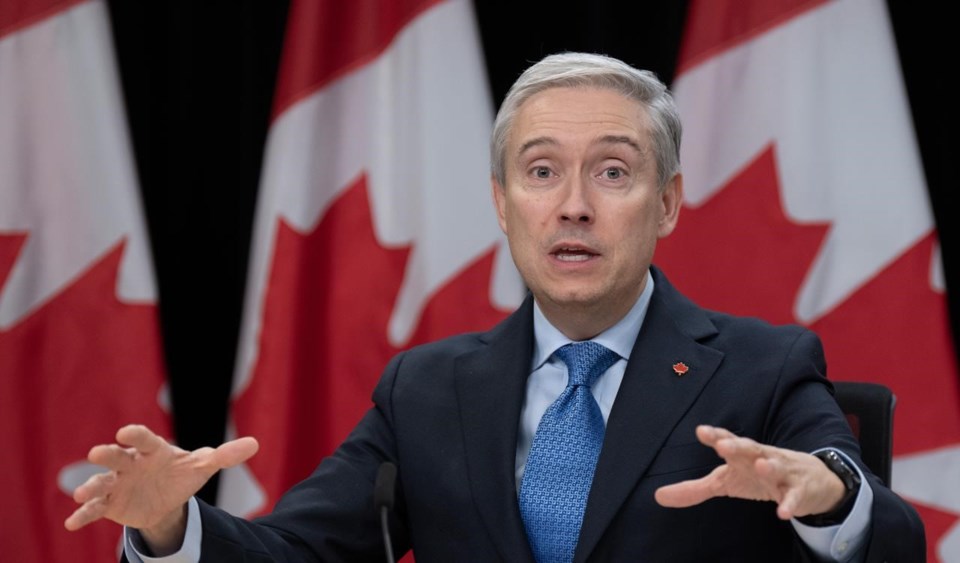Federal ministers on Tuesday downplayed the number of foreign workers NextStar Energy Inc. will likely bring in to help build its heavily subsidized battery plant in Windsor, Ont., without providing specifics as to how many they expect will come.
Industry Minister François-Philippe Champagne said the company, jointly owned by Stellantis and South Korea-based LG Corp, needs to bring in a limited number of workers with expertise to help establish an electric vehicle battery industry in sa���ʴ�ý.
"So you'll have a few people, very few people, selected people, who need to come to transfer technology, because this is a new industry."
He said he spoke with the head of Stellantis on Monday and was reassured by his commitment to hire Canadians.
Labour groups and politicians raised concerns in recent days after Windsor police said that they were helping prepare for a potential 1,600 workers from South Korea to come and help build the plant, which is expected to cost upwards of $15 billion in public support.
NextStar chief executive Danies Lee confirmed Monday that the company still plans to hire about 2,500 Canadians to run the plant, and is also engaging up to 2,300 local and regional tradespeople to help build it.
He said the company would still need to bring in additional temporary staff who have "proprietary knowledge and specialized expertise" to help in the factory's construction and launch.
NextStar however didn't specify how many workers it expects to bring in, a question Ontario's Minister of Labour, David Piccini, and Minister of Economic Development, Vic Fedeli, pushed the federal government on Tuesday.
In a letter to their federal counterparts, they called for the disclosure of the number of foreign workers already on the ground working on building the plant, and how many will be arriving under federal programs.
"Taxpayers and workers deserve to know that every job related to this project that can be filled by a Canadian worker is filled by a Canadian worker and that no Canadian worker is displaced," they said in the letter.
Fedeli said in a scrum that there was always an expectation some foreign workers would come to help get things started, but that the scale being talked about was nothing like they had anticipated so he's pushing for clarification.
Federal Employment Minister Randy Boissonnault said to reporters Tuesday that only one worker has been approved so far through the temporary foreign worker program, which assesses if there are Canadians available to fill the roll before allowing a foreign hire.
He said the estimate floating around seemed excessive.
"There is no justification that we can see for the number that the South Korean ambassador raised with 1,600 people."
At the same event, Immigration Minister Marc Miller noted that because sa���ʴ�ý has a free-trade agreement with South Korea, companies are able to bring in employees on work visas, or visa free, to carry out some work.
Fewer than 100 people have come in as foreign workers, said Miller, a category distinct from temporary foreign workers.
"They are training people up," said Miller. "Not a single Canadian job that has been promised will be affected by this, but people do come and go as part of our free trade agreement with South Korea."
Bringing in workers to help establish a plant is a common practice, said Greig Mordue, McMaster University’s ArcelorMittal chair in advanced manufacturing.
"It's not uncommon for people that have expertise in launching products to come in and help with the installation and the fine tuning of the equipment, and the laying out of the processes to make sure that it's done in the most efficient way."
He said the 1,600 number seems like a lot, but that the company has an incentive to try to get the plant running as soon as possible because the funding incentives start to wind down in 2030.
Mordue said Volkswagen would also likely bring in some workers to help with its plant in St. Thomas, Ont., and Northvolt with its battery factory planned near Montreal, but that fewer will be needed as expertise builds.
"Over time, local knowledge accumulates, so that over time, there are fewer foreign workers that come in to help with that process," he said.
Champagne said the federal government expects NextStar to prioritize Canadian workers, but that it's also important to keep in mind the bigger picture of the future of battery manufacturing industry.
"We're going to have a transfer of knowledge, allowing us to be successful for decades."
This report by The Canadian Press was first published Nov. 21, 2023.
— With files from Stephanie Taylor in Ottawa
Ian Bickis, The Canadian Press
Note to readers: This is a corrected story. A previous version said Industry Minister François-Philippe Champagne had been in touch with NextStar CEO. As well, a misspelling of Marc Miller's name has been corrected.



